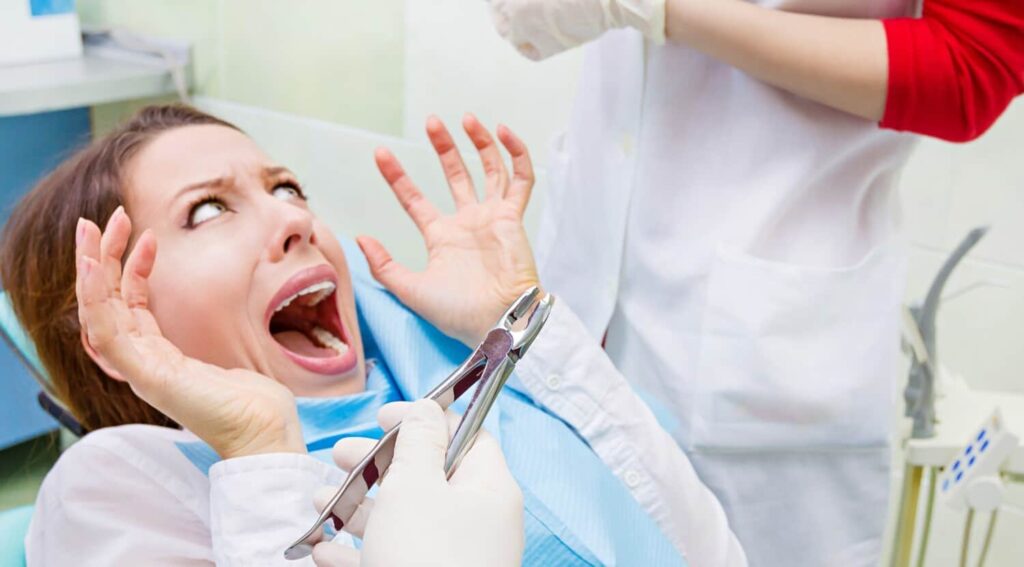What is dental anxiety?
Dental anxiety is a type of anxiety that is specifically related to dental procedures. It can range from mild nervousness to severe panic attacks. People with dental anxiety may avoid going to the dentist altogether, or they may only go when they have a dental emergency.
What are the signs and symptoms of dental anxiety?
Some of the most common signs and symptoms of dental anxiety include:
Sweating
Racing heart (Tachycardia)
Low blood pressure or dizziness
What are the causes of dental anxiety?
There are many causes of dental anxiety. Some of the most common causes include:
Past negative experiences: If you had a bad experience at the dentist in the past, such as a painful procedure, you may be more likely to experience dental anxiety.
Fear of pain: Many people are afraid of pain, and this fear can be especially strong when it comes to dental procedures.
Fear of the unknown: Dental procedures can be unfamiliar and scary, and this can lead to anxiety for some people.
Fear of needles: Some people are afraid of needles, and this fear can make it difficult to get dental injections.
Social anxiety: Some people have social anxiety, which is a fear of social situations. This can make it difficult for them to go to the dentist, where they may feel vulnerable and exposed.

Does dental anxiety affect your oral health?
Dental anxiety can lead to:
Avoidance of dental care: People with dental anxiety often avoid going to the dentist, even for routine check-ups and cleanings. This can lead to dental problems going untreated, which can worsen over time.
Poor oral hygiene: People with dental anxiety may not brush and floss their teeth as often as they should, which can increase the risk of cavities, gum disease, and other oral health problems.
Increased stress levels: The stress of dental anxiety can have a negative impact on overall health, including oral health. Stress can weaken the immune system, making it more difficult to fight off infection. It can also lead to clenching and grinding of the teeth, which can damage teeth and the jaw.
If you have dental anxiety, it’s important to talk to your dentist about ways to manage it.
There are a number of things that can help, such as:
Behavioural therapy: This type of therapy can help you to change your thinking and behaviour about dental care. In some cases, your dentist may prescribe medication to help you relax during dental visits.
Nitrous oxide (laughing gas): This gas can help to reduce anxiety and pain during dental procedures.
Sedation dentistry: This type of dentistry uses medication to put you into a relaxed state during dental procedures.
Tips for coping with dental anxiety
If you are experiencing dental anxiety, here are a few ways to cope with it:
Do your research and prepare for your appointment: Before your appointment, take some time to prepare yourself. This could include reading about dental procedures, talking to your dentist about your anxiety, or practicing relaxation techniques.
Find a dentist you trust: It’s important to find a dentist who is understanding and patient. They should be willing to work with you to find ways to manage your anxiety.
Bring a friend or family member with you to your appointments: If you are feeling anxious, it can be helpful to bring a friend or family member with you to your appointment. This person can provide support and help you relax.
Don’t be afraid to ask for help: If you’re struggling to manage your dental anxiety, don’t be afraid to ask your dentist for help. Ask your dentist about relaxation techniques that can help to reduce anxiety, such as deep breathing, visualisation, and meditation. Or they can refer you to a therapist or other healthcare provider who can help you develop a plan to manage your anxiety.
Dental anxiety is a common problem, but it is a problem that can be overcome. With the right treatment, you can overcome your dental anxiety and get the dental care you need to maintain good oral health.
Want to book an appointment?
Book online by clicking here. Call our friendly team on 3390 6100 or email us.









0 Responses
I must express my gratitude for your insightful blog post on “Dental Anxiety.” This is a topic that affects countless individuals, and your article addressed it with sensitivity and understanding. Your explanation of the various causes and symptoms of dental anxiety was comprehensive, and I appreciated the tips you provided for managing and overcoming it.